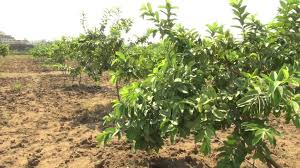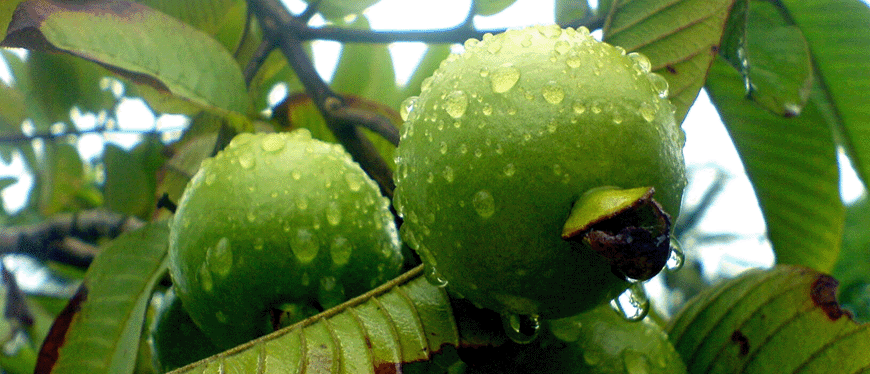Crop Production
Guava (Psidium guajava): Guava grows on small trees with spreading branches, may grow to a height and spread of 6-9 m. The guava bears fruit all year round. Guava trees grow well in tropical conditions, though it can tolerate drought better than many tropical fruits. It is also adapted to many soil types and may thrive even on shallow, infertile soils.
Soil and Climate
-
 Soil
& Climate : It is one of the hardiest
fruit trees adaptable to a wide variety of soil and
climatic conditions and comes up well even under
neglected conditions. Guava can be successfully grown
under tropical and sub-tropical climate, thrives in both
humid and dry climates and is highly resistant to
drought, sensitive to water logging and extreme winter, susceptible to frost.
Optimum temperature is 23-26oC though it can
withstand up to 46oC. It is so well
acclimatized that at present it is grown throughout the
length and breadth of the country from sea level to 1300
m altitude. However, it produces abundant crop of better
quality in areas having a distinct dry and moderate
winter. Guava seems indiscriminate as to soil, doing
equally well on heavy clay, light sand, gravel bars near
streams, or on limestone; and tolerates a pH range from
4.5 to 9.4. It is one of the hardiest fruit crop to soil
salinity also and can survive up to 7.5 dSm-1
or 8.0 dSm-1, but sodium content in soil
should not be beyond 40 ESP. However, the crop performs
best on red sandy loams with pH range of 5 to 6.
Soil
& Climate : It is one of the hardiest
fruit trees adaptable to a wide variety of soil and
climatic conditions and comes up well even under
neglected conditions. Guava can be successfully grown
under tropical and sub-tropical climate, thrives in both
humid and dry climates and is highly resistant to
drought, sensitive to water logging and extreme winter, susceptible to frost.
Optimum temperature is 23-26oC though it can
withstand up to 46oC. It is so well
acclimatized that at present it is grown throughout the
length and breadth of the country from sea level to 1300
m altitude. However, it produces abundant crop of better
quality in areas having a distinct dry and moderate
winter. Guava seems indiscriminate as to soil, doing
equally well on heavy clay, light sand, gravel bars near
streams, or on limestone; and tolerates a pH range from
4.5 to 9.4. It is one of the hardiest fruit crop to soil
salinity also and can survive up to 7.5 dSm-1
or 8.0 dSm-1, but sodium content in soil
should not be beyond 40 ESP. However, the crop performs
best on red sandy loams with pH range of 5 to 6.

